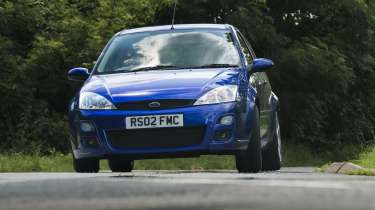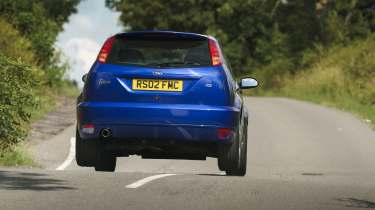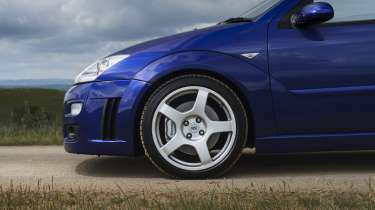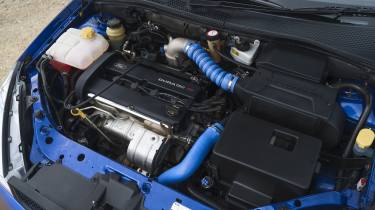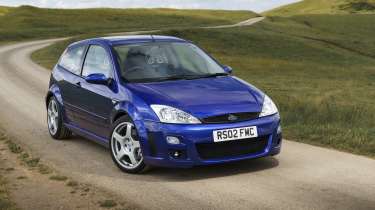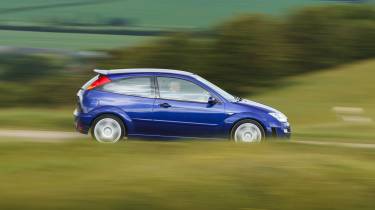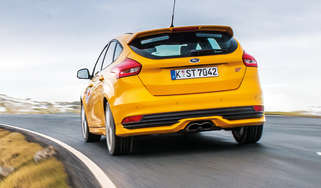Ford Focus RS Mk1 (2002 - 2003): a rally-inspired hot hatch icon
It could be unruly but the hottest of the first-generation Focus models was a blisteringly quick and rewarding machine
Drive a poorly set up Mk1 Focus RS and Ford’s motorsport-grade hot hatch will tumble in your estimations. That was certainly the case for evo when we drove early examples in period; where was the finesse, effortless speed and composure this WRC-inspired halo model promised? With Sachs dampers, wide-track suspension and a Quaife limited-slip diff, the specification was mouth-watering, but the result was a scruffy, unruly car on the road. Sometimes…
Two decades on, having driven a few carefully maintained examples on modern tyres, the RS has cemented itself as a true evo icon. Its blend of interaction and ability is addictive in the context of today’s effortlessly exploitable four-wheel-drive mega-hatches. You just need to make sure you buy a good one.
> Ford GT (2004 - 2006): review, history and specs of an icon
The Focus RS doesn’t need to be moving to announce its intentions. It comes from a time when the best specialised performance cars didn’t look or feel mass produced. The RS’s swollen bodywork, ground-hugging stance and Sparco bucket seats scream homologation special, even though it wasn’t one in a traditional sense. Instead, it was merely inspired by the Focus RS world rally car of the time, with 70 per cent of its components either new or reworked. A heavily modified 2-litre Duratec motor sits at the heart of the RS, with new pistons, forged conrods and a Garrett turbocharger lifting power to 212bhp, all of which is sent to the front wheels.
More reviews
Rather than moulding to your driving style, the Focus RS relies on careful technique to deliver its best. Tuck the nose in, get the car settled and it’s simply a question of how committed you can be to the throttle. Get it just right and the Quaife differential pulls the nose onto your chosen line as the motor flurries towards the 6500rpm red line, but if you’re too eager on the power the front wheels will begin to scramble around – a useful measure of how hard you’re working the chassis.
There are certainly more powerful, more competent hot hatches out there, but the Mk1 RS has a unique flair and charisma that makes every drive special. It can also lay claim to being one of the very first superhatches. The trouble is, its relative rarity (2147 examples came to the UK) and the provenance of the RS badge have catapulted it to modern classic status, with prices to match.
A useable RS with reasonable mileage will set you back upwards of £20,000, but as we said earlier, it’s a car that varies dramatically depending on maintenance and set-up. It’s worth accounting for decent tyres, fresh suspension components and geometry correction in your budget, or else you might not uncover the car’s full potential. At worst, you’ll wonder why you’ve spent FK8 Civic Type R money on a raggedy old Focus.
Another potential issue is rust. Even well-kept RSs can hide rotten secrets behind those plastic sill cover extensions, so have a look underneath for signs of structural corrosion or poor repairs. The floor pans and jacking points should be solid unless you fancy your chances with a welding gun, and replacements aren’t available for the bulging RS-specific front and rear wings. Find a tidy example, though, and the Mk1 Focus RS should be no less demanding to own than other hot hatches of the time, while also being immune to depreciation.
Ford Focus RS Mk1 in detail
Ford had been campaigning a Focus RS in the WRC and the decision was taken to produce a road-going model to ape the competition version. The car received its first viewing at the Birmingham International motor show in 2000, but it wasn’t until the 2001 Geneva motor show that the production model was revealed in all its glory.
Using the three-door shell (all painted in Imperial Blue) it might have looked like a Focus, but with its blistered arches and aggressive stance it was far removed from the cooking versions. Ford reckoned the Focus RS was conceived and produced in a 15-month period, and while it might not have been developed by the same team fettling the WRC car, it was thoroughly re-engineered with around 70 per cent of the car’s parts being either new or reworked.
At its heart was a 2-litre Duratec DOHC four-cylinder turbocharged engine which developed 212bhp at 5500rpm and 229lb ft of torque at 3500rpm. By today’s standards those outputs are nothing to write home about, but when the RS was new it was more than enough for the front-wheel-drive hatch to handle and good enough for a 0-60mph time of 5.9sec and a claimed top speed of 143mph.
For its Focus RS application the engine went through a number of upgrades. The block had a modified oil return system and fitted to it were pistons whose design aped those of the WRC car, albeit with a lower compression ratio. The standard Duratec cams were retained but forged conrods were fitted to cope with the extra forces they’d be subjected to. A Garrett turbocharger was fitted along with a modified exhaust manifold, a larger bore exhaust system, a revised air intake set-up and a water-to-air intercooler. Further modifications included revised engine management, higher flow injectors along with an oil cooler and a water pump with a 50 per cent improvement in flow.
The Focus’s new-found power was transmitted by a beefed up five-speed manual gearbox with unique gear ratios, a short-shift mechanism and an uprated AP Racing clutch. The challenge of successfully channelling 212bhp through the front wheels was given to a Quaife automatic torque-biasing differential, designed to distribute torque to whichever wheel had the most traction to prevent wheelspin. In operation it was far from seamless on many examples and could make the RS an unruly companion, with the steering wheel grabbing one way or another, especially on bumpy roads.
Further revisions to tame the unruly beast included modified camber settings for the front suspension along with an 18mm front anti-roll bar and a revised steering rack. Dampers were by Sachs and at the rear the multi-link suspension was stiffened, while a sturdier anti-roll bar was installed along with uprated bushes.
Stopping power came from Brembo 324mm ventilated discs and four-pot calipers up front, while those at the rear were solid 280mm items. Covering the brakes were a set of bespoke 18-inch OZ Racing light-alloy wheels, fitted with 225/40 R18 Michelin low-profile tyres developed specifically for the Focus RS.
While the bonnet, doors, roof panel and tail/headlamps remained standard, every other exterior element was painstakingly developed and honed to help create a car that was clearly identifiable as the hottest of Foci. While WRC styling cues were added, these had to be production items, so the front and rear wings with wide wheelarch extensions were made from metal rather than composites, while reinforced polypropylene moulded front and rear bumpers, side sills and a rear spoiler mounted on the tailgate completed the package.
Inside there was a tricolour – black, blue and silver – theme dominated by a pair of Sparco high-backed seats, trimmed in blue and black leather and Alcantara. The steering wheel was also trimmed in the blue/black combination with a blue marker in the 12 o’clock position, while an aluminium handbrake handle and gearknob, along with Sparco aluminium pedals, were added. Bespoke dials with flashes of blue around the dials’ edges helped to smarten up an otherwise very recognisably Focus dash with its plethora of black plastic finishes.
In total Ford made 4501 Mk1 Focus RS models at its Saarlouis plant in Germany between October 2002 and November 2003, with the UK accounting for the lion’s share of sales, a total of 2147 being sold over here. – Bob Harper
Ford Focus RS (Mk1) specs
| Engine | 1988cc, in-line 4-cyl |
| Power | 212bhp @ 5500rpm |
| Torque | 229lb ft @ 3500rpm |
| Weight | 1275kg |
| Power-to-weight | 169bhp/ton |
| 0-60mph | 5.9sec (claimed) |
| Top speed | 143mph (claimed) |
| Price | £19,995 (2002) |
What we said
‘This was no WRC car for the road, but instead the hot hatch reimagined with all the engineering might Ford could throw at it. A team of 60 worked on the RS for two years and they deemed it necessary to upgrade 70 per cent of the Focus’s basic components for the return of that iconic badge. So while it was never stage-proven, with Sachs dampers, Brembo brakes, a Garrett GT2560LS turbocharger, Quaife torque-sensing limited-slip differential, 25mm lower ride height and 65mm wider track, there was no doubting that the Focus RS meant business. The world really did hold its breath for this car.’ – evo 195
What to pay*
*Prices correct as of April 2024
| Excellent | £35,000 |
| Good | £25,000 |
| Average | £17,000 |

